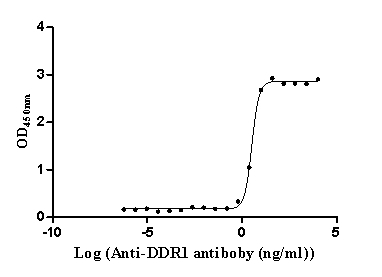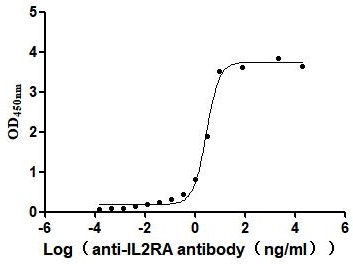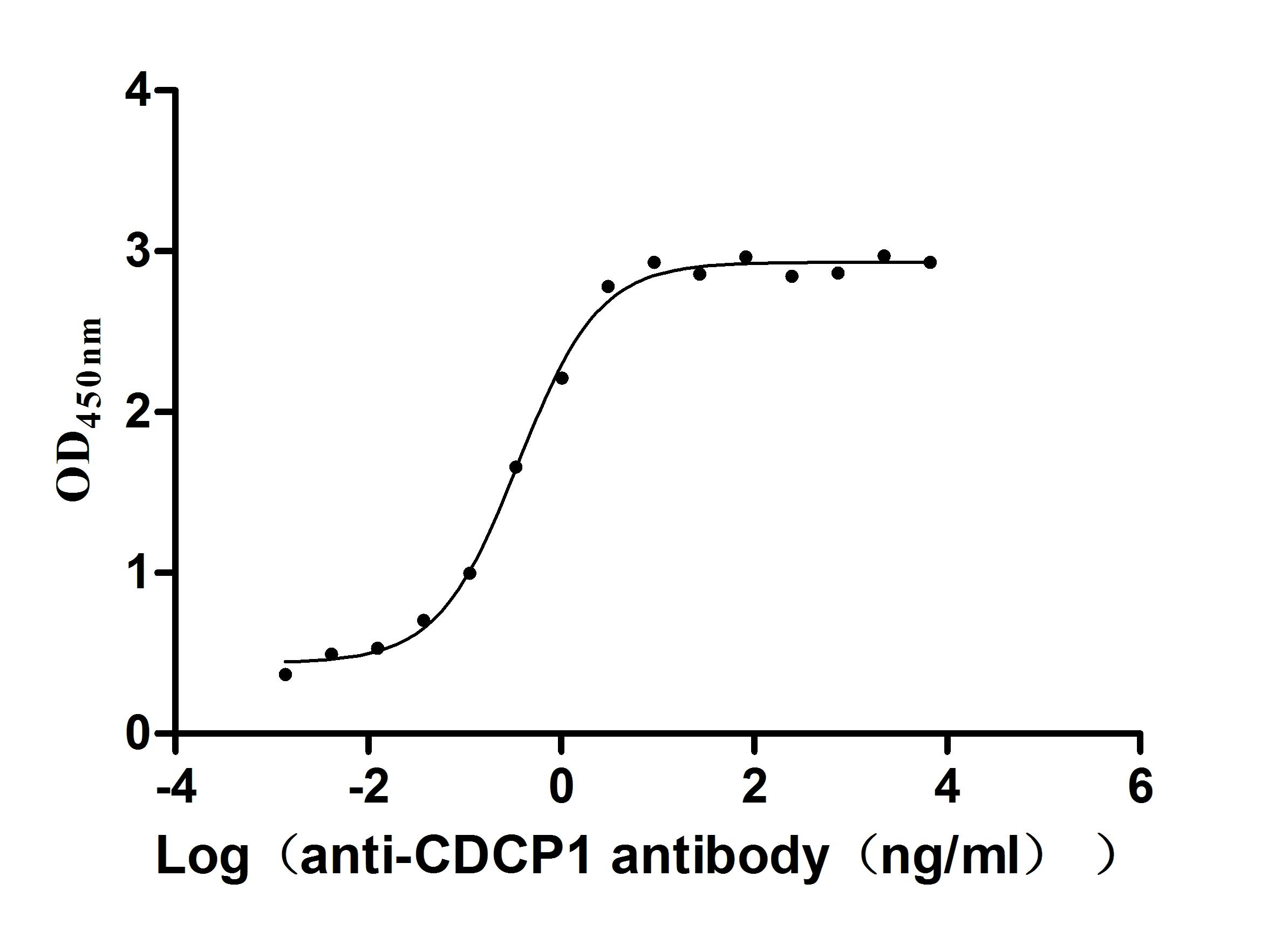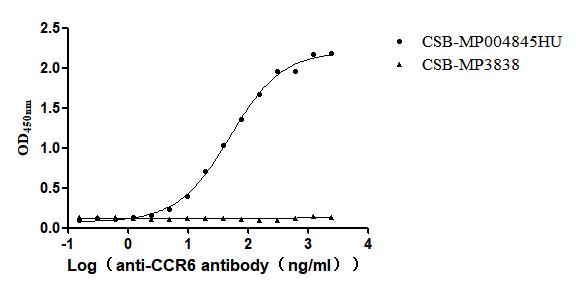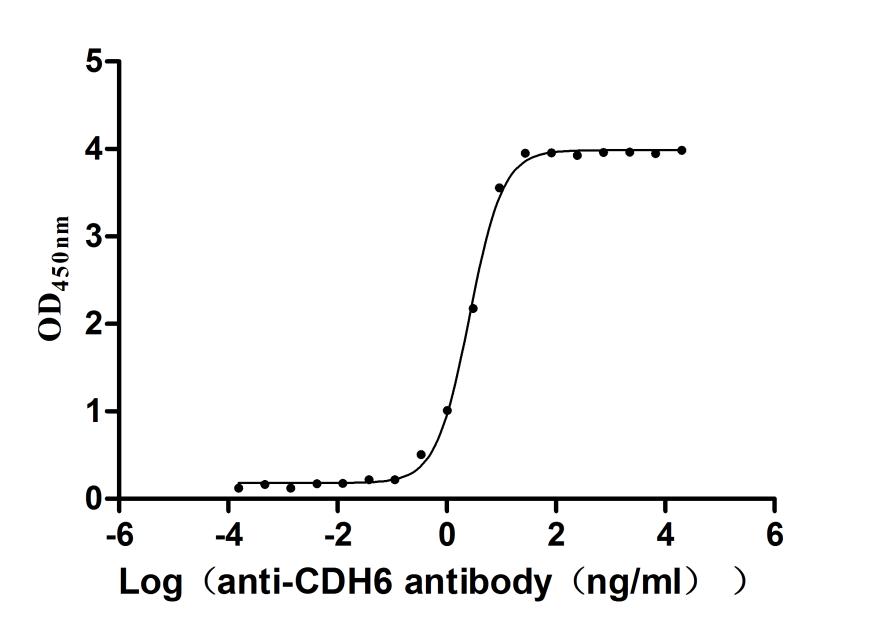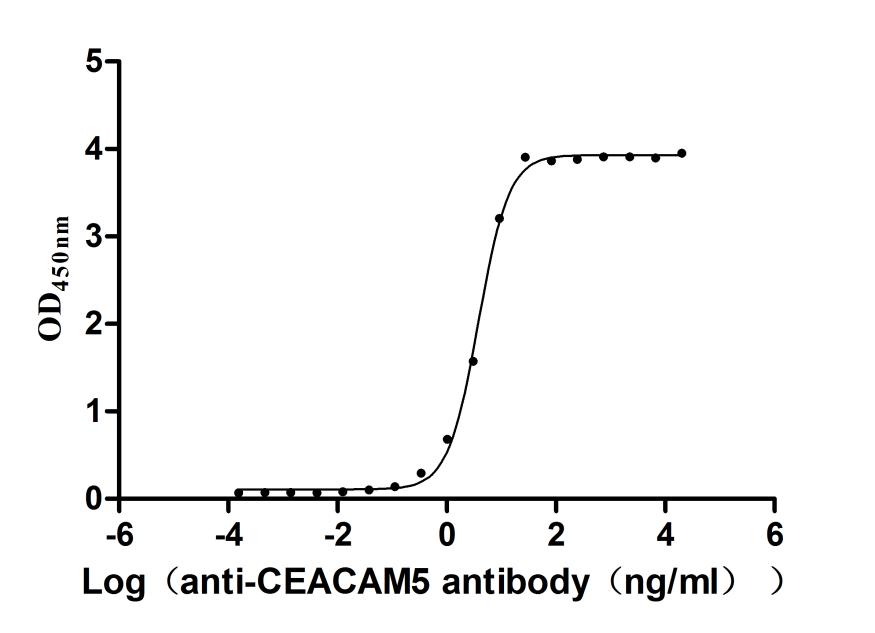Recombinant Human Granulysin (GNLY)
-
货号:CSB-YP009627HU
-
规格:
-
来源:Yeast
-
其他:
-
货号:CSB-EP009627HU
-
规格:
-
来源:E.coli
-
其他:
-
货号:CSB-EP009627HU-B
-
规格:
-
来源:E.coli
-
共轭:Avi-tag Biotinylated
E. coli biotin ligase (BirA) is highly specific in covalently attaching biotin to the 15 amino acid AviTag peptide. This recombinant protein was biotinylated in vivo by AviTag-BirA technology, which method is BriA catalyzes amide linkage between the biotin and the specific lysine of the AviTag.
-
其他:
-
货号:CSB-BP009627HU
-
规格:
-
来源:Baculovirus
-
其他:
-
货号:CSB-MP009627HU
-
规格:
-
来源:Mammalian cell
-
其他:
产品详情
-
纯度:>85% (SDS-PAGE)
-
基因名:GNLY
-
Uniprot No.:
-
别名:519; D2S69E; GNLY; GNLY_HUMAN; Granulysin; Granulysin precursor; LAG 2; LAG2; Lymphocyte activation gene 2; Lymphokine LAG 2; Lymphokine LAG-2; NKG 5; NKG5; Protein NKG5; T cell activation protein 519 ; T lymphocyte activation gene 519; T-cell activation protein 519; TLA519
-
种属:Homo sapiens (Human)
-
蛋白长度:Full Length of Mature Protein
-
表达区域:23-145
-
氨基酸序列RLSPEYYD LARAHLRDEE KSCPCLAQEG PQGDLLTKTQ ELGRDYRTCL TIVQKLKKMV DKPTQRSVSN AATRVCRTGR SRWRDVCRNF MRRYQSRVTQ GLVAGETAQQ ICEDLRLCIP STGPL
-
蛋白标签:Tag type will be determined during the manufacturing process.
The tag type will be determined during production process. If you have specified tag type, please tell us and we will develop the specified tag preferentially. -
产品提供形式:Lyophilized powder
Note: We will preferentially ship the format that we have in stock, however, if you have any special requirement for the format, please remark your requirement when placing the order, we will prepare according to your demand. -
复溶:We recommend that this vial be briefly centrifuged prior to opening to bring the contents to the bottom. Please reconstitute protein in deionized sterile water to a concentration of 0.1-1.0 mg/mL.We recommend to add 5-50% of glycerol (final concentration) and aliquot for long-term storage at -20℃/-80℃. Our default final concentration of glycerol is 50%. Customers could use it as reference.
-
储存条件:Store at -20°C/-80°C upon receipt, aliquoting is necessary for mutiple use. Avoid repeated freeze-thaw cycles.
-
保质期:The shelf life is related to many factors, storage state, buffer ingredients, storage temperature and the stability of the protein itself.
Generally, the shelf life of liquid form is 6 months at -20°C/-80°C. The shelf life of lyophilized form is 12 months at -20°C/-80°C. -
货期:Delivery time may differ from different purchasing way or location, please kindly consult your local distributors for specific delivery time.Note: All of our proteins are default shipped with normal blue ice packs, if you request to ship with dry ice, please communicate with us in advance and extra fees will be charged.
-
注意事项:Repeated freezing and thawing is not recommended. Store working aliquots at 4°C for up to one week.
-
Datasheet :Please contact us to get it.
相关产品
靶点详情
-
功能:Antimicrobial protein that kills intracellular pathogens. Active against a broad range of microbes, including Gram-positive and Gram-negative bacteria, fungi, and parasites. Kills Mycobacterium tuberculosis.
-
基因功能参考文献:
- The results suggest granulysin as a novel marker for a subset of cytotoxic natural killer cell derived malignancies PMID: 30151671
- These results suggest that the 15 kDa granulysin exhibits a novel mechanism in bacteria killing in a way that's different from most antimicrobial peptides. PMID: 27276051
- Decreased blood granulysin at the protein level, is linked to the immunological condition of latent tuberculosis infection. PMID: 27756230
- Carbamate pesticides significantly reduced the intracellular levels of perforin, GrA, GrB, Gr3/K, and GRN in NK-92CI cells. PMID: 25921628
- serum GNLY is closely associated with the clinical characteristics of nasopharyngeal carcinoma and may be a potential biomarker for nasopharyngeal carcinoma PMID: 26751807
- GNLY delivers Gzms into three protozoan parasites (Trypanosoma cruzi, Toxoplasma gondii and Leishmania major), in which the Gzms generate superoxide and inactivate oxidative defense enzymes to kill the parasite. PMID: 26752517
- Studies indicate that cytotoxic mechanisms mediated by granulysin and TRAIL (TNF-related apoptosis inducing ligand) seem to be less secondary effects on normal tissues. PMID: 26314314
- High Granulysin expression is associated with Cutaneous T Cell Lymphoma and Sezary Syndrome. PMID: 26225678
- A three-way interaction between SNPs in HLA-DQ and GNLY was identified in terms of HBV clearance. PMID: 25644528
- GNLY-expressing lymphocytes, probably attracted by IL-15, not only participate partially in myocardial cell apoptosis, but also hasten resolution of cardiac leukocyte infiltration in patients with myocardial infarction. PMID: 21967803
- Peptides encoded by this gene display antimicrobial activity against S. typhimurium, L. monocytogenes, E. coli, S. aureus, C. neoformans, C. albicans, L. major, and M. tuberculosis. PMID: 10644038
- Serum granulysin levels were significantly elevated in both acute and chronic alopecia areata patients. PMID: 24035442
- Human, but not rodent, cytotoxic granules also contain granulysin, an antimicrobial peptide in addition to granzymes; study shows that granulysin delivers granzymes into bacteria to kill diverse bacterial strains. PMID: 24906149
- It was concluded taht granulysin induces apoptosis on hematological tumor cells and on cells from B-cell lymphocytic leukemia patients, opening the door to research on its use as a new anti-tumoral treatment. PMID: 24269628
- suggested that the alteration of circulating granulysin has potential function in host immune response against TB and HIV/TB coinfection PMID: 23801887
- study to determine: expression of GNLY at the gene and protein levels at the maternal-fetal interface, relationship(s) between GNLY and perforin, and GNLY secretion by stimulated NK cells PMID: 23399514
- Granulysin is closely associated with the characteristics of NK-cell neoplasms and serum granulysin may serve as a novel biomarker for these disorders. PMID: 22890551
- GNLY polymorphism genotypes and diplotypes were associated with the chronicity of HBV PMID: 22788687
- recombinant 15 kDa granulysin is not cytolytic but is a potent inducer of monocytic differentiation to dendritic cells PMID: 22586033
- Proliferating memory T cells (CFSE(low)CD4(+)CD45RO(+)) were identified as main source of granulysin and these cells expressed both central and effector memory phenotype PMID: 22216262
- Findings suggest that Vgamma9Vdelta2 T cell-mediated production of granulysin as an underestimated immune effector in malaria. PMID: 22045985
- Granulysin is expressed at different levels in multiple cutaneous adverse drug reactions both by NKp46(+) cells and by CD8(+) T cells. PMID: 21819408
- All these data clearly show the abundant expression and spontaneous secretion of GNLY by decidual NK cells during first trimester pregnancy. PMID: 21623991
- Gene expression profiles of monocytes cultured with 15 kDa Granulysin or GM-CSF for 4, 12, 24 and 48 hours were analysed to unravel both similarities and differences between the effects of these stimulators. PMID: 21501511
- Cytotoxic T- and natural killer (NK) cell-delivered transgenic granulysin induces endoplasmic reticulum stress, activating caspase-7 and distinct apoptotic pathways in target cells. PMID: 21296981
- Both 9- and 15-kDa forms of recombinant GNLY-induced in vitro chemotaxis and activation of both human and mouse dendritic cells. PMID: 20660289
- these data provide details about the complex regulation leading to granulysin expression and anticryptococcal activity in primary CD4(+) T cells. PMID: 20889547
- The megakaryoblastic leukemia cell line CMK, from a Down's syndromept, expressed granulysin mRNA, suggesting that GNLY is occasionally present in immature multilineage cells or may be characteristic of leukemic cells obtained from Down's syndrome pts. PMID: 12145461
- Up-regulation of granulysin in primary CD8 T cells correlates with the acquisition of anticryptococcal activity, which can be blocked by specific inhibition of granulysin. PMID: 12421959
- Sequence analysis of this gene do not support it as a candidate gene for familial hemophagocytic lymphohistiocytosis. PMID: 12483306
- Data report the initial crystal structure of selenomethionyl granulysin by MAD phasing at 2A resolution. PMID: 12488100
- Granulysin is detected in a granular pattern in the cytoplasm of alpha GalCer-activated NKT cells consistent with their presence within cytotoxic granules and suggests that these cells can mediate antimicrobial activity. PMID: 12626573
- mRNA expression measurement of granulysin in urinary cells of renal allograft ents allows the early noninvasive detection of ongoing acute rejection. PMID: 15223905
- granulysin was found exclusively in endosomal-phagosomal vesicles; lipid raft microdomains, enriched in the immunological synapse, may thus enhance uptake and transfer of granulysin into bacterial infected host cells PMID: 15778384
- Granulysin not only contributes to innate immunity but also to adaptive immunity as it attracts and activates human monocytes, dendritic, natural killer (NK) and T cells. PMID: 15843520
- Granulysin expression in CD8 cells seems to be correlated with steroid resistance in polymyositis PMID: 16980658
- These cells use granulysin as the effector molecule, and priming is dysregulated in HIV-infected patients, which results in defective microbicidal activity PMID: 17038537
- This study shows that the regulation of granulysin synthesis in response to IL-2 or bacterial antigen stimulation occurs at several levels: RNA expression, extensive alternative splicing and posttranslational processing. PMID: 17596262
- Serum granulysin is elevated in patients with hemophagocytic lymphohistiocytosis PMID: 18192122
- study found PI3K & STAT5 signaling pathways are required for granulysin expression & IL-2Rbeta induction & IL-2Rbeta induction is a prerequisite for granulysin expression; both signaling pathways are defective in CD4+ T cells from HIV-infected patients PMID: 18490721
- Increased expression in pbmc and elevated serum levels correlated with the severity of primary biliary cirrhosis PMID: 18584314
- granulysin is involved in spontaneous abortion. PMID: 18688023
- Granulysin in the blister fluids was a 15-kDa secretory form PMID: 19029983
- serum granulysin is a novel parameter of patients cancer immunity PMID: 19106590
- Results demonstrate the localization and effect of intracellularly expressed granulysin on non-native cancer cells and indicate its potential utility in gene therapy for cancer. PMID: 19111751
- High granulysin mrna expression is associated with systemic anaplastic large cell lymphoma. PMID: 19243819
- Granulysin can target lysosomes to induce partial release of lysosomal contents into the cytosol; relocalized lysosomal cathepsin B can process Bid to active tBid to cause cytochrome c and apoptosis-activating factor release from mitochondria. PMID: 19454696
- HIV-1 infection of peripheral blood mononuclear cells may reduce the antimicrobial profile of activated CD8+ T cells by disrupting signaling events that are critical for the induction of granulysin. PMID: 19687290
- GLS/IL-12-modified Mycobacterium smegmatis as a novel anti-tuberculosis immunotherapeutic vaccine. PMID: 19861007
- This molecule activates a pathway of CTL- and NK cell-mediated death via disruption of cell and mitochondrial membranes. This is a distinct pathway from granzyme- and death receptor-induced apoptosis. PMID: 11418670
显示更多
收起更多
-
亚细胞定位:Secreted. Note=Located in the cytotoxic granules of T-cells, which are released upon antigen stimulation.
-
组织特异性:Expressed in natural killer and T-cells.
-
数据库链接:
HGNC: 4414
OMIM: 188855
KEGG: hsa:10578
STRING: 9606.ENSP00000263863
UniGene: Hs.105806
Most popular with customers
-
Recombinant Human Epithelial discoidin domain-containing receptor 1 (DDR1), partial (Active)
Express system: Mammalian cell
Species: Homo sapiens (Human)
-
Recombinant Human Interleukin-2 receptor subunit alpha (IL2RA), partial (Active)
Express system: Mammalian cell
Species: Homo sapiens (Human)
-
Recombinant Human CUB domain-containing protein 1 (CDCP1), partial (Active)
Express system: Mammalian cell
Species: Homo sapiens (Human)
-
Recombinant Human C-C chemokine receptor type 6(CCR6)-VLPs (Active)
Express system: Mammalian cell
Species: Homo sapiens (Human)
-
Recombinant Human Cadherin-6(CDH6),partial (Active)
Express system: Mammalian cell
Species: Homo sapiens (Human)
-
Express system: Mammalian cell
Species: Macaca mulatta (Rhesus macaque)


